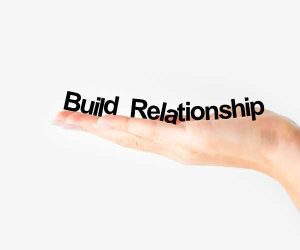Building relationships for small business growth
Starting and growing a small business can be a challenging task, but building strong relationships with customers, employees, and other stakeholders can make all the difference in ensuring its success. Relationships are key in creating a supportive network and generating new business opportunities, which can ultimately drive growth. However, it is not always easy to establish these connections, and it takes effort and dedication to cultivate them over time.
In this article, we will explore the various ways in which small business owners can build and maintain meaningful relationships that drive growth, including effective communication, showing appreciation, and understanding the needs of those they interact with. Whether you’re just starting out or looking to take your business to the next level, this article will provide valuable insights and practical tips on how to build and strengthen relationships for your small business’s success.
Related Articles;
- 7 Practical Ways To Overcoming The Fear Of Failure In Business
- The importance of emotional intelligence for small business owners
- The Power of Positive Thinking For Small Business Owners
What are business relationships?

Business relationships are connections and interactions between companies, individuals, and organizations that work together to achieve common goals. These relationships can be formal or informal, and they can encompass a wide range of activities, from collaborating on projects to exchanging goods and services. In a business context, relationships are established between companies and their customers, suppliers, partners, employees, and other stakeholders.
Having strong business relationships is essential for the success and growth of a company. Good relationships can help to build trust and understanding, which can lead to increased cooperation, greater productivity, and improved business outcomes. On the other hand, weak or damaged relationships can have negative impacts on a business, including lost opportunities, decreased efficiency, and reputational damage.
Why are business relationships important?

1. Increased cooperation
Strong business relationships encourage increased cooperation between companies, individuals, and organizations. When people trust and understand each other, they are more likely to work together in a collaborative and productive manner. This can lead to greater efficiency, better outcomes, and improved results.
2. Improved productivity
Relationships built on trust and understanding can improve the productivity of both parties involved. When employees feel valued and supported, they are more likely to be engaged and motivated, which can result in higher-quality work. Likewise, customers are more likely to be loyal and satisfied when they have a positive relationship with a company.
3. Increased trust
Trust is a critical component of any successful business relationship. When people trust each other, they are more likely to share information, work together towards common goals, and collaborate effectively. Trust also helps to reduce conflict and build stronger relationships over time.
4. New business opportunities
Building strong relationships can open up new business opportunities. For example, customers may refer new business to a company they have a positive relationship with, or partners may collaborate on new projects together. Relationships can also provide access to new networks and resources that can help drive growth.
5. Improved reputation
Companies with positive relationships with their stakeholders are more likely to have a good reputation, which can be invaluable in attracting new business and retaining existing customers. Conversely, businesses with negative relationships can suffer from reputational damage, which can harm their ability to succeed in the long term.
See Why Business Relationships Are The Key to Successful Growth
How do you build effective business relationships?

Building effective business relationships require effort and dedication, but the benefits can be significant. Here are some key strategies for building strong business relationships:
1. Communication
Good communication is the foundation of any strong relationship. Make sure to listen actively, be clear and concise in your messaging, and respond promptly to inquiries. Regular check-ins and updates can help to keep the lines of communication open and prevent misunderstandings.
2. Show appreciation
A little gratitude can go a long way in building strong relationships. Show appreciation for the work of others, offer compliments and praise where appropriate, and be mindful of their time and needs. Simple gestures, such as sending a thank you note or a small gift, can help to build trust and show that you value the relationship.
3. Understanding
Understanding the needs, goals, and perspectives of others is key to building strong relationships. Take the time to understand their point of view, and be open to their feedback and suggestions. This will help to foster mutual respect and increase the chances of a successful partnership.
4. Flexibility
Flexibility is important in building effective relationships. Be open to change and be willing to accommodate the needs and demands of others when necessary. This can help to build trust and create an environment of mutual support.
5. Honesty and transparency
Honesty and transparency are critical components of any relationship. Be straightforward and honest in all interactions, and be transparent about your goals, intentions, and plans. This will help to build trust and reduce the likelihood of misunderstandings.
6. Shared values
Building relationships with people who share your values and beliefs can be particularly beneficial. When you share a common vision, it is easier to understand each other, work together effectively, and achieve your goals.
How to maintain business relationships

Maintaining business relationships is just as important as building them. Here are some key strategies for maintaining strong, long-lasting business relationships:
1. Consistency
Consistency is key to maintaining business relationships. Make sure to follow through on commitments, be reliable, and keep to agreed-upon schedules and deadlines. This will help to build trust and credibility over time.
2. Open communication
Regular, open communication is critical to maintaining strong business relationships. Make time for regular check-ins and updates, and be proactive in addressing any issues or concerns that arise. This will help to keep the lines of communication open and prevent misunderstandings.
3. Flexibility
Be open to change and be willing to accommodate the needs and demands of others when necessary. This can help to build trust and create an environment of mutual support.
4. Problem-solving
Be proactive in solving problems and addressing challenges as they arise. Be willing to compromise, listen to the perspective of others, and work together to find mutually beneficial solutions.
5. Appreciation
Show appreciation for the work of others, offer compliments and praise where appropriate, and be mindful of their time and needs. Small gestures, such as sending a thank you note or a small gift, can help to maintain strong relationships over time.
6. Keep learning
Continuously learn about the needs, goals, and perspectives of others, and be open to feedback and suggestions. This will help to foster mutual respect and increase the chances of a successful partnership.
What are the benefits of building relationships for small business owners?

Building strong business relationships can bring many benefits to small business owners, including:
1. Increased sales and profits
Strong relationships with customers, suppliers, and other key stakeholders can help to increase sales and profits by providing access to new customers, increasing repeat business, and improving customer satisfaction.
2. Improved customer loyalty
Building strong relationships with customers can help to improve customer loyalty and reduce customer churn. Customers are more likely to remain loyal to a business that they feel is trustworthy and cares about their needs.
3. Enhanced reputation
Strong relationships with customers, suppliers, and other stakeholders can enhance a business’s reputation and increase its credibility in the market. A positive reputation can help to attract new customers and increase the business’s overall competitiveness.
4. Improved partnerships and collaborations
Building strong relationships with other businesses and organizations can help to create new partnerships and collaborations that drive growth and innovation. These relationships can provide access to new customers, new markets, and new technologies, helping businesses to stay ahead of the competition.
5. Increased access to capital and funding
Building strong relationships with investors and financial institutions can help to increase access to capital and funding. This can provide the resources needed to grow the business, invest in new projects, and expand into new markets.
6. Improved employee morale
Building strong relationships with employees can help to improve employee morale, reduce turnover, and increase productivity. When employees feel valued and appreciated, they are more likely to be engaged and committed to the success of the business.
Conclusion
Building and maintaining strong business relationships is essential for small business growth and success. By focusing on consistency, open communication, flexibility, problem-solving, appreciation, and continuous learning, small business owners can develop strong, long-lasting relationships with customers, suppliers, employees, and other key stakeholders. These relationships can bring many benefits, including increased sales and profits, improved customer loyalty, enhanced reputation, improved partnerships and collaborations, increased access to capital and funding, and improved employee morale. To be successful, small business owners must invest time and resources into building and maintaining these relationships, and be proactive in addressing any challenges that arise. With the right approach, small businesses can build strong relationships that drive growth and success for years to come.
[…] Amazing Ways To Building Relationships For Small Business Growth […]